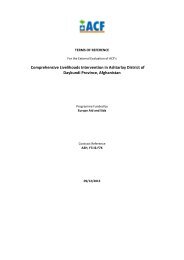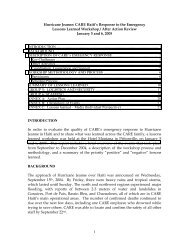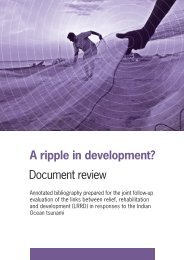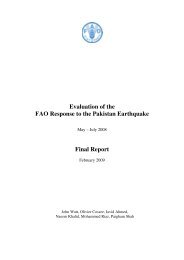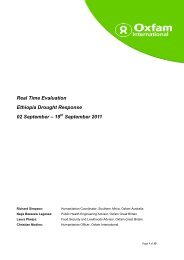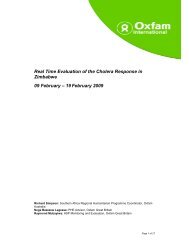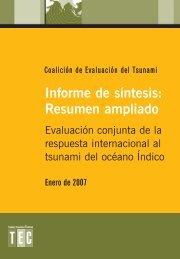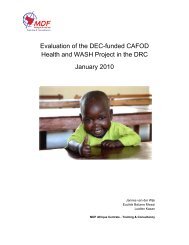Inter-Agency Real Time Evaluation of the Humanitarian ... - alnap
Inter-Agency Real Time Evaluation of the Humanitarian ... - alnap
Inter-Agency Real Time Evaluation of the Humanitarian ... - alnap
Create successful ePaper yourself
Turn your PDF publications into a flip-book with our unique Google optimized e-Paper software.
IA RTE <strong>of</strong> <strong>the</strong> humanitarian response to Pakistan’s 2010 Floods crisis<br />
separate latrines…) to address women’s access to assistance. However, <strong>the</strong> response was<br />
generally gender blind on most fronts.<br />
The current response plans are based on individual agency and sectoral early recovery needs<br />
assessments. Most organizations are preparing new assessments but few <strong>of</strong> <strong>the</strong>se are<br />
coordinated centrally to ensure that <strong>the</strong>y are aligned to GoP’s recovery strategies and efforts.<br />
While only a few sectors claim to have clarity <strong>of</strong> early recovery scope and needs, today, <strong>the</strong>re is<br />
no comprehensive assessment <strong>of</strong> outstanding recovery needs. Disaster response better meets<br />
requirements where assessment is an ongoing process and is responsive to changing conditions<br />
and feeds into programming.<br />
Multi‐sector area based approaches are best suited for disasters <strong>of</strong> this size as sector or cluster<br />
based approaches soon spread thin. Geographical area based approaches allow for better<br />
coverage, <strong>the</strong>y are more adaptive to changing needs and <strong>the</strong>y provide better opportunities for<br />
interlinkages between relief, recovery and rehabilitation.<br />
Effectiveness, efficiency and accountability <strong>of</strong> some UN agencies and INGOs have been<br />
questioned by donors, GoP and implementing partners. Some donors questioned UN’s added<br />
value with high transaction costs and multiple implementation layers before reaching<br />
beneficiaries. In general, <strong>the</strong>re is insufficient commitment to <strong>the</strong> aid effectiveness agenda,<br />
specifically in areas <strong>of</strong> accountability.<br />
Pakistan is a disaster hotspot exposed to recurrent hydrological and meteorological events.<br />
Despite <strong>the</strong> existence <strong>of</strong> national and sometimes also provincial plans, to date disaster<br />
management has been reactive as investments in DRR are insufficient. The civilian disaster<br />
management capacity at provincial and district level is low and coordination capacity is not<br />
always functioning properly. The links between national and provincial disaster management are<br />
generally weak and preparedness was insufficient to provide a more effective and efficient<br />
response. Pakistan is one <strong>of</strong> <strong>the</strong> eight pilot countries where <strong>the</strong> One UN has been rolled out and<br />
disaster risk management (DRM) is one <strong>of</strong> <strong>the</strong> five strategic priorities, however, contingency<br />
planning with a clear division <strong>of</strong> labour among <strong>the</strong> government and <strong>the</strong> international community<br />
is generally missing. The next disaster is “just around <strong>the</strong> corner” as <strong>the</strong> next monsoon season<br />
will soon start. The risk for a new emergency situation is high due to <strong>the</strong> concentration <strong>of</strong> poor<br />
people living in hazardous areas along river shores. Today <strong>the</strong>re is a clear need to consider DRM<br />
and preparedness into UNDAF process, led by One UN within <strong>the</strong> joint programming approach<br />
Pakistan has been a key test‐ground for <strong>the</strong> humanitarian reform and currently faces some <strong>of</strong><br />
<strong>the</strong> most important humanitarian challenges. However <strong>the</strong> humanitarian community is suffering<br />
from a chronic amnesia as it does not take stock <strong>of</strong> lessons learned from prior evaluations. A<br />
more systemic follow up on previous recommendations is needed as it would help improve <strong>the</strong><br />
effectiveness and efficiency <strong>of</strong> <strong>the</strong> humanitarian system’s response to future disasters, both<br />
within Pakistan and globally. A strong UN leadership must engage and ensure a continued and<br />
close dialogue with Pakistani authorities as well as ensuring that stakeholders and partners are<br />
held accountable.<br />
Riccardo Polastro, Aatika Nagrah, Nicolai Steen and Farwa Zafar<br />
58




